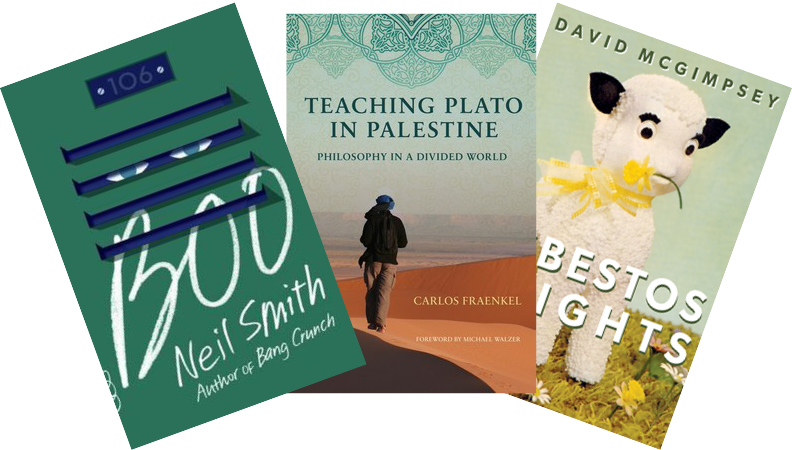
“…shivering together as readers and as writers…”
The Quebec Writers’ Federation hosted its 17th annual gala on November 18, 2015. Author Adam Leith Gollner opened the ceremony with this remarkable meditation on how a writer seesaws between isolation and community, and on what it means to be a writer, right here, right now.
Good evening, everyone. Thank you all for being here. And thank you as well to Lori Schubert and the whole Quebec Writers’ Federation team not just for inviting me to host this evening’s ceremony – but for all the hard work you do behind the scenes, supporting our writing community year in and year out. It’s an honour to be part of this gathering. I’m grateful to have received QWF awards in the past, and I’m thrilled to be able to participate in welcoming this year’s nominees.
One of the shortlisted books that stood out to me this year was Kim Thùy’s Mãn, translated by Sheila Fishman, which is up for the Cole Foundation Prize for Translation. Many of us remember Thùy’s first book, Ru, about her family’s journey from Vietnam to refugee camp to new life in Montreal. There’s a moment in Mãn when a character on a ferry crossing the Mekong has to throw all her ID papers overboard. She realizes that if she wants to survive, she will have to get rid of her identity.
It’s such a vital question here in Montreal, in Quebec, in Canada – the question of identity – for the French majority, for the Anglophone minority, and for all the other cultural communities who have made their lives here. As Mordecai Richler famously said: “Nobody is quite sure what our culture is, or if we even have a national culture at all.”
One of the things that has always struck me about living in this city is the way it can be hard to feel a real sense of belonging here. Many French don’t feel like they belong to this country; many English don’t consider themselves to be a part of this French society; and countless minority groups feel marginalized here as well. Perhaps one quality that connects all of us is that sense of not belonging. It seems to me that there is something quintessentially Montreal about not really fitting in. To be bound together by our outsiderness – to belong by sharing a sense of not belonging – it’s an interesting way of thinking about identity in Montreal. And it’s doubly interesting for this community of writers, which is, after all, made up of people pursuing their craft in isolation.
It’s one thing to be a writer who belongs to an invisible community made up of all the writers you have ever loved, but it’s another thing to actually connect with your peers, with those whose work you admire, with talented, smart friends – which is another reason that this gathering is so important.
Each year, this event brings the city’s writers together. Every year, I learn about books via the QWF awards that I would have not otherwise known about. New books like Anita Anand’s Swing in the House, about the private lives of modern families just like yours and mine. Or Neil Smith’s Boo, which describes the afterlife in vivid detail, from the perspective of a thirteen-year-old obsessed with evolutionary biology. Or Teaching Plato in Palestine, by Carlos Fraenkel, which suggests that philosophy can provide a way forward in the Middle East. Fraenkel’s thoughts on multiculturalism are fascinating—especially in the context of a mixed-up city like this.

Three of the 2015 QWF award-winning books
The great Dany Laferrière believes we should all be whoever we want to be – as he explains in his book Je suis un écrivain japonais (I Am a Japanese Writer). What a perfectly Montreal concept: why not be a Japanese writer, even if you are born in Haiti and live in Ahuntsic? He dedicates that book to anyone who has ever wanted to be someone else. All of his books are about his life, and all of his books are about writing. And what he reminds us is that literature can bring us together, it can erase boundaries, it can connect us – no matter how isolated we may feel.
I felt that reading the opening to Kathleen Winter’s Boundless, nominated for theMavis Gallant Prize for Non-Fiction, which is about her journey through the Northwest Passage. It opens with an epigram by Aaju Peter: “The body is a feather blown across the tundra.”
What a lovely line, I thought, “The body is a feather blown across the tundra.” You can’t really get more isolated than that. But then I realized: I know Aaju! I know the person who wrote that – and I love her. We ate raw seal together in her dining room. She was one of the main people I interviewed while shooting a documentary in Iqaluit last winter. Coming across that passage reminded me again of the fundamental way that books can bring us closer together – and not just in a superficial, I-met-her fanboy sort of way, but in a “we are all feathers blowing across the tundra” sense.
When I read a beautiful passage in one of Heather O’Neill’s books, I feel a sense of belonging. There’s a moment, in the title story of her new collectionDaydreams of Angels, when a cherub descends in Montreal during World War II. He goes on a date with a local girl named Yvette, and starts playing the trumpet for her after dinner: “Although impossible to put into words, his melodies sounded most like a baby cooing in its sleep, a girl laughing under the covers, a moan escaping from someone’s lips while making love.”
As readers, we all get to hear that angel’s music – we all get to be part of Heather’s gang. And when I think about the writers I know in this city, no matter how tenuously, I realize that I am part of a community, one that would be far more tenuous if it weren’t for the QWF.
 Adam Leith Gollner is the author of The Fruit Huntersand The Book of Immortality. The former Editor in Chief of Vice Magazine, Gollner has written for The New Yorker, The New York Times, The Wall Street Journal, The Guardian, The Globe and Mail, Smithsonian, Lucky Peach, and The Paris Review. He lives in the Mile End.
Adam Leith Gollner is the author of The Fruit Huntersand The Book of Immortality. The former Editor in Chief of Vice Magazine, Gollner has written for The New Yorker, The New York Times, The Wall Street Journal, The Guardian, The Globe and Mail, Smithsonian, Lucky Peach, and The Paris Review. He lives in the Mile End.
Photos: Roxane Clediere (top0; Terence Byrnes (headshot)